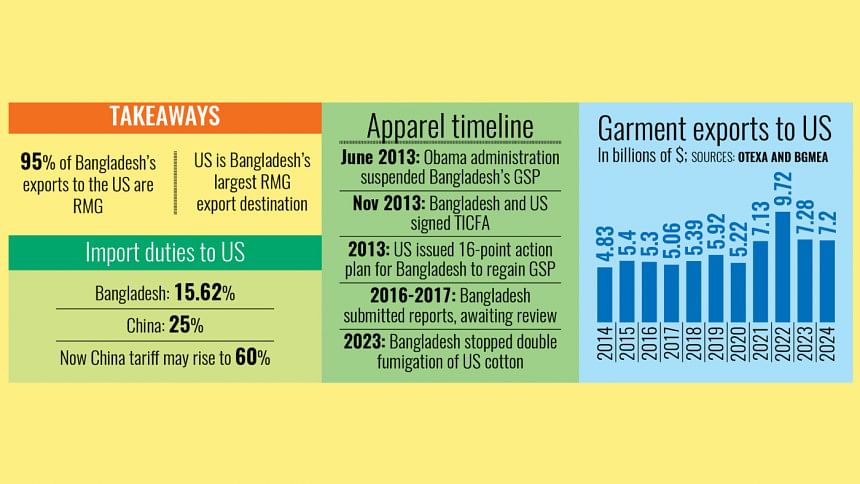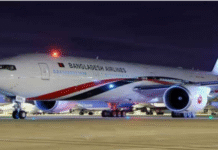
US President-elect Donald Trump’s trade policies towards China and Mexico could ultimately benefit Bangladesh, according to local apparel exporters.
In recent months, Bangladesh’s garment exports to the US market have been improving gradually as more American clothing retailers and brands arrive with increased work orders, mainly shifted from China, they said.
The exporters said that punishing tariffs as high as 60 percent on Chinese goods will drive more international clothing retailers and brands to Bangladesh in the future.
Bangladesh is already a preferred destination for American buyers because of competitive prices, its capability to churn out huge export volumes, and improved workplace safety at local factories.
For these reasons, they said Bangladesh has performed strongly in US markets over the years, even with a 15.62 percent duty to the US market.
The US government allows zero-duty benefits on imports of 97 percent of products from the least developed countries (LDCs).
The US government has not included garment items in the 97 percent package, and local garment exporters have urged the government multiple times to negotiate with the US to reduce tariffs on Bangladeshi goods.
AK Azad, chairman and managing director of Ha-Meem Group, who exports the majority of his garment products to the USA, said, “The imposition of high tariffs on China and Mexico will create an opportunity for Bangladesh. A lot of apparel work orders are expected to be shifted from China and Mexico to Bangladesh, India, and Pakistan.”
He added that some US-based retailers and brands that shifted work orders away from Bangladesh because of the political crisis and labour unrest last year “are now coming back with increased work orders”.
FIRST, BANGLADESH SHOULD GET READY
Azad said Bangladesh should first “do some homework” so that the opportunity can be utilised.
For instance, adequate supplies of utilities such as gas and power need to be ensured for industrial units to run at full production, he added, noting that gas prices are already high for industrial use.
MA Jabbar, managing director of DBL Group, echoed Azad’s views.
“The buyers are preferring Bangladesh now as Trump in his speeches said he would impose a high tariff on Chinese and Mexican goods,” he said.
In recent years, some basic garment orders were shifted to Mexico but are now returning to Bangladesh, he said, calling for adequate energy supplies to industrial units to enable them to run at full capacity.
The law and order situation should be improved, and investment in man-made fibre, garment, and backward linkage industries needs to be developed soon to capture more of the American market, he said.
Faruque Hassan, former president of the Bangladesh Garment Manufacturers and Exporters Association (BGMEA), said, “So far, Trump’s speeches have indicated that he will impose a higher tariff on goods from China and Mexico, which may open a new window of opportunity for Bangladesh.”
“If the Trump administration imposes higher tariffs on goods from China and Mexico, either the work orders or investment will shift to Bangladesh from these two countries,” he said.
LOCAL EXPORTERS BOAST BRIGHT PROSPECTS
Following the Rana Plaza garment factory collapse in 2013 and subsequent Generalized System of Preferences (GSP) withdrawal by the US, Bangladesh has made remarkable improvements in workplace safety to meet international standards.
This has already somewhat satisfied American retailers and brands.
As a result, international clothing retailers and brands can no longer question the country’s compliance standards and improved variety of clothing items.
Moreover, the longstanding issue of double fumigation of US cotton in Bangladesh has been lifted at the request of the Biden administration, improving trade relations between the US and Bangladesh.
Double fumigation of US cotton had been a requirement in Bangladesh for almost 50 years. Lifting this requirement simplifies trade and lowers the cost and time of importing US cotton.
Local exporters believe their strong performance record will help the Trump administration view Bangladesh as a reliable source of clothing items.
Masrur Reaz, chairman of Policy Exchange Bangladesh, said, “Garment export may increase as Bangladesh does not have any other competitive products to be exported to the USA.”
“If Bangladesh can improve the investment climate, like improving energy supply, the country may further benefit from the shifted investment from China and Mexico due to the imposition of high tariffs and the sustained tariff war between the USA and China,” Reaz added.
Republican president-elect Donald Trump will be sworn in at the White House tomorrow for a four-year term.
Daily Star









